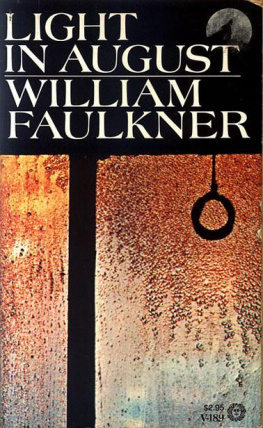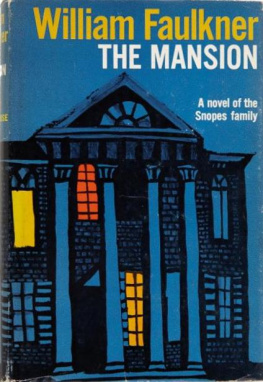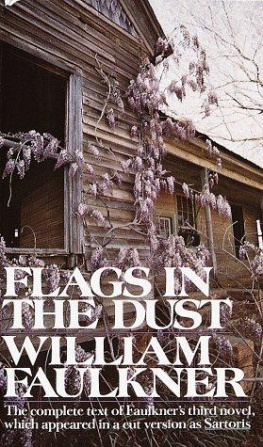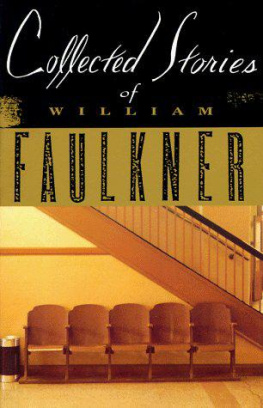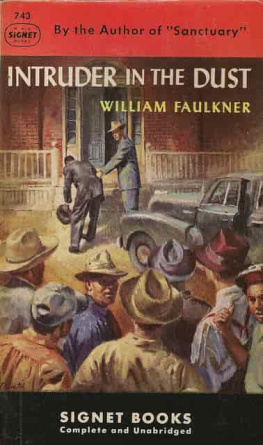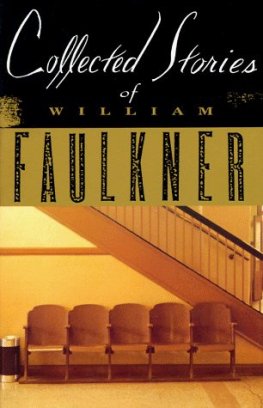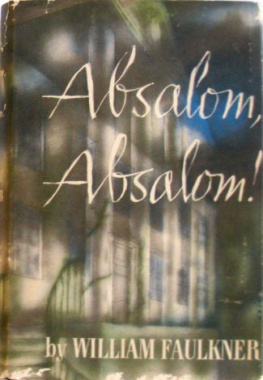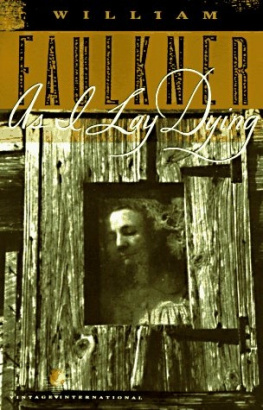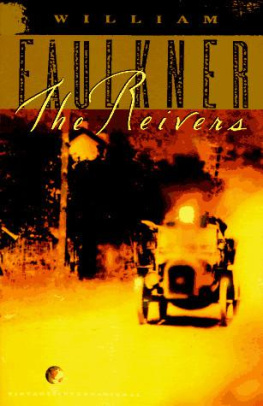William Faulkner - Light in August
Here you can read online William Faulkner - Light in August full text of the book (entire story) in english for free. Download pdf and epub, get meaning, cover and reviews about this ebook. year: 1972, publisher: Vintage, genre: Art. Description of the work, (preface) as well as reviews are available. Best literature library LitArk.com created for fans of good reading and offers a wide selection of genres:
Romance novel
Science fiction
Adventure
Detective
Science
History
Home and family
Prose
Art
Politics
Computer
Non-fiction
Religion
Business
Children
Humor
Choose a favorite category and find really read worthwhile books. Enjoy immersion in the world of imagination, feel the emotions of the characters or learn something new for yourself, make an fascinating discovery.
- Book:Light in August
- Author:
- Publisher:Vintage
- Genre:
- Year:1972
- Rating:3 / 5
- Favourites:Add to favourites
- Your mark:
- 60
- 1
- 2
- 3
- 4
- 5
Light in August: summary, description and annotation
We offer to read an annotation, description, summary or preface (depends on what the author of the book "Light in August" wrote himself). If you haven't found the necessary information about the book — write in the comments, we will try to find it.
Light in August — read online for free the complete book (whole text) full work
Below is the text of the book, divided by pages. System saving the place of the last page read, allows you to conveniently read the book "Light in August" online for free, without having to search again every time where you left off. Put a bookmark, and you can go to the page where you finished reading at any time.
Font size:
Interval:
Bookmark:
LIGHT IN AUGUST
WILLIAM FAULKNER
VINTAGE BOOKS
A DIVISION OF RANDOM HOUSE/NEW YORK
VINTAGE BOOKS EDITION, JANUARY 1972
Copyright 1932, by William Faulkner
Copyright Renewed 1959 by William Faulkner
All rights reserved under International and Pan-American
Copyright Conventions. Published in the United States
by Random House, Inc., New York. Distributed in Canada by
Random House of Canada Limited, Toronto.
Originally published by
Harrison Smith and Robert Haas, in 1932.
ISBN: 0-394-71189-0
Library of Congress Catalog Card Number: 67-12716
MANUFACTURED IN THE UNITED STATES OF AMERICA
PUBLISHERS NOTE
The text of this edition of Light in August has been photographed from, and is therefore identical with, a copy of the first printing. Publication date was October 6, 1932.
Contents
Chapter 1
SITTING beside the road, watching the wagon mount the hill toward her, Lena thinks, I have come from Alabama: a fur piece. All the way from Alabama a-walking. A fur piece. Thinking although I have not been quite a month on the road I am already in Mississippi, further from home than I have ever been before. I am now further from Doanes Mill than I have been since I was twelve years old .
She had never even been to Doanes Mill until after her father and mother died, though six or eight times a year she went to town on Saturday, in the wagon, in a mail-order dress and her bare feet flat in the wagon bed and her shoes wrapped in a piece of paper beside her on the seat. She would put on the shoes just before the wagon reached town. After she got to be a big girl she would ask her father to stop the wagon at the edge of town and she would get down and walk. She would not tell her father why she wanted to walk in instead of riding. He thought that it was because of the smooth streets, the sidewalks. But it was be cause she believed that the people who saw her and whom she passed on foot would believe that she lived in the town too.
When she was twelve years old her father and mother died in the same summer, in a log house of three rooms and a hall, without screens, in a room lighted by a bugswirled kerosene lamp, the naked floor worn smooth as old silver by naked feet. She was the youngest living child. Her mother died first. She said, Take care of paw. Lena did so. Then one day her father said, You go to Doanes Mill with McKinley. You get ready to go, be ready when he comes. Then he died. McKinley, the brother, arrived in a wagon. They buried the father in a grove behind a country church one afternoon, with a pine headstone. The next morning she departed forever, though it is possible that she did not know this at the time, in the wagon with McKinley, for Doanes Mill. The wagon was borrowed and the brother had promised to return it by nightfall.
The brother worked in the mill. All the men in the village. worked in the mill or for it. It was cutting pine. It had been there seven years and in seven years more it would destroy all the timber within its reach. Then some of the machinery and most of the men who ran it and existed because of and for it would be loaded onto freight cars and moved away. But some of the machinery would be left, since new pieces could always be bought on the installment plangaunt, staring, motionless wheels rising from mounds of brick rubble and ragged weeds with a quality profoundly astonishing, and gutted boilers lifting their rusting and unsmoking stacks with an air stubborn, baffled and bemused upon a stumppocked scene of profound and peaceful desolation, unplowed, untilled, gutting slowly into red and choked ravines beneath the long quiet rains of autumn and the galloping fury of vernal equinoxes. Then the hamlet which at its best day had borne no name listed on Postoffice Department annals would not now even be remembered by the hookwormridden heirs-at-large who pulled the buildings down and buried them in cookstoves and winter grates.
There were perhaps five families there when Lena arrived. There was a track and a station, and once a day a mixed train fled shrieking through it. The train could be stopped with a red flag, but by ordinary it appeared out of the devastated hills with apparitionlike suddenness and wailing like a banshee, athwart and past that little less-than-village like a forgotten bead from a broken string. The brother was twenty years her senior. She hardly remembered him at all when she came to live with him. He lived in a four room and unpainted house with his labor- and child-ridden wife. For almost half of every year the sister-in-law was either lying in or recovering. During this time Lena did all the housework and took care of the other children. Later she, told herself, I reckon thats why I got one so quick myself.
She slept in a lean-to room at the back of the house. It had a window which she learned to open and close again in the dark without making a sound, even though there also slept in the lean-to room at first her oldest nephew and then the two oldest and then the three. She had lived there eight years before she opened the window for the first time. She had not opened it a dozen times hardly before she discovered that she should not have opened it at all. She said to herself, Thats just my luck.
The sister-in-law told the brother. Then he remarked her changing shape, which he should have noticed some time before. He was a hard man. Softness and gentleness and youth (he was just forty) and almost everything else except a kind of stubborn and despairing fortitude and the bleak heritage of his bloodpride had been sweated out of him. He called her whore. He accused the right man (young bachelors, or sawdust Casanovas anyway, were even fewer in number than families) but she would not admit it, though the man had departed six months ago. She just repeated stubbornly, Hes going to send for me. He said he would send for me; unshakable, sheeplike, having drawn upon that reserve of patient and steadfast fidelity upon which the Lucas Burches depend and trust, even though they do not intend to be present when the need for it arises. Two weeks later she climbed again through the window. It was a little difficult, this time. If it had been this hard to do before, I reckon I would not be doing it now, she thought. She could have departed by the door, by daylight. Nobody would have stopped her. Perhaps she knew that. But she chose to go by night, and through the window. She carried a palm leaf fan and a small bundle tied neatly in a bandanna handkerchief. It contained among other things thirty-five cents in nickels and dimes. Her shoes were a pair of his own which her brother had given to her. They were but slightly worn, since in the summer neither of them wore shoes at all. When she felt the dust of the road beneath her feet she removed the shoes and carried them in her hand.
She had been doing that now for almost four weeks. Behind her the four weeks, the evocation of far , is a peaceful corridor paved with unflagging and tranquil faith and peopled with kind and nameless faces and voices: Lucas Burch? I dont know. I dont know of anybody by that name around here. This road? It goes to Pocahontas. He might be there. Its possible. Heres a wagon thats going a piece of the way. It will take you that far; backrolling now behind her a long monotonous succession of peaceful and undeviating changes from day to dark and dark to day again, through which she advanced in identical and anonymous and deliberate wagons as though through a succession of creakwheeled and limpeared avatars, like something moving forever and without progress across an urn.
The wagon mounts the hill toward her. She passed it about a mile back down the road. It was standing beside the road, the mules asleep in the traces and their heads pointed in the direction in which she walked. She saw it and she saw the two men squatting beside a barn beyond the fence. She looked at the wagon and the men once: a single glance all-embracing, swift, innocent and profound. She did not stop; very likely the men beyond the fence had not seen her even look at the wagon or at them. Neither did she look back. She went on out of sight, walking slowly, the shoes unlaced about her ankles, until she reached the top of the hill a mile beyond. Then she sat down on the ditchbank, with her feet in the shallow ditch, and removed the shoes. After a while she began to hear the wagon. She heard it for some time. Then it came into sight, mounting the hill.
Next pageFont size:
Interval:
Bookmark:
Similar books «Light in August»
Look at similar books to Light in August. We have selected literature similar in name and meaning in the hope of providing readers with more options to find new, interesting, not yet read works.
Discussion, reviews of the book Light in August and just readers' own opinions. Leave your comments, write what you think about the work, its meaning or the main characters. Specify what exactly you liked and what you didn't like, and why you think so.

